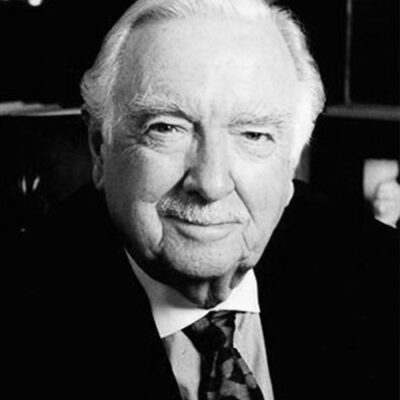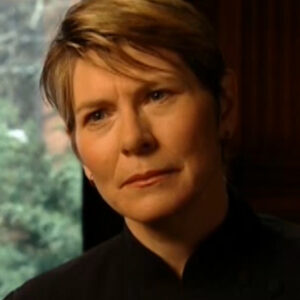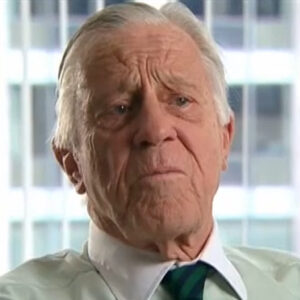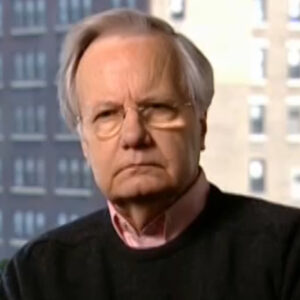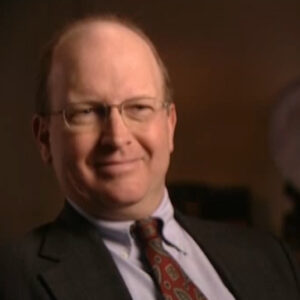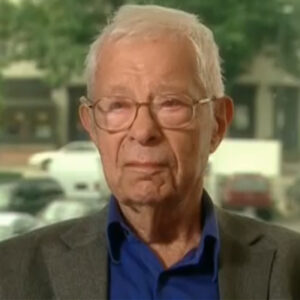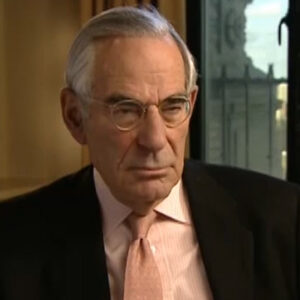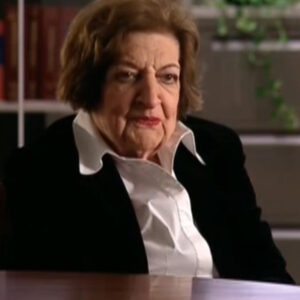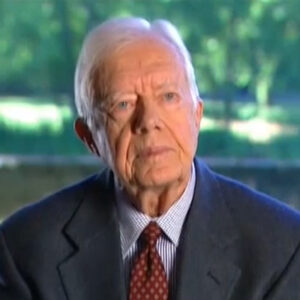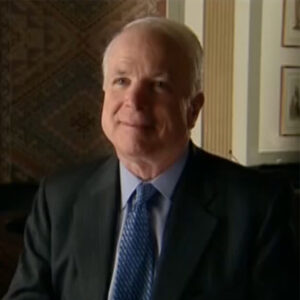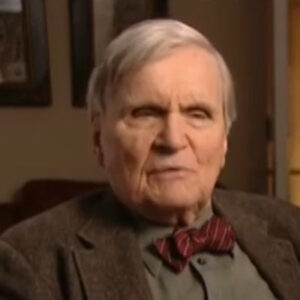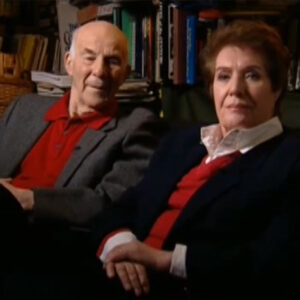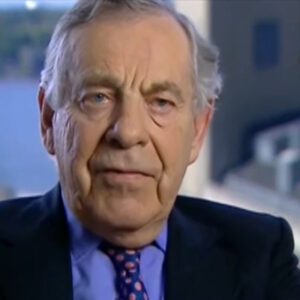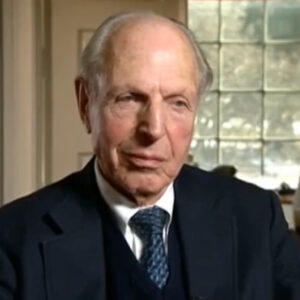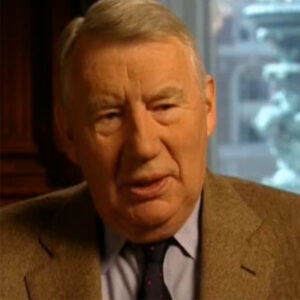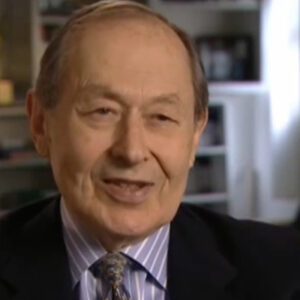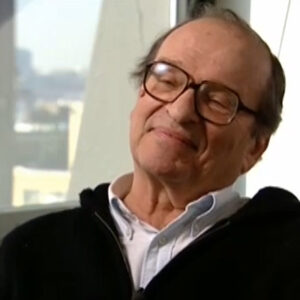Speaker I can only imagine what it was like for Walter Cronkite getting thrown into the Texas legislature in the 1930s. I mean, what a cross between the zoo and the circus.
Speaker He must have just been in hog heaven. Oh, you here? He was a student at the J School. University of Texas. And they would send downtown to cover what had to be one of the funniest ongoing disasters in the history of democracy.
Speaker And of course, during the thirties, oh, so delicious. Texas politics were so delicious. They were dull. I mean, you know, there are all kinds of just complete nitwits and morons who kept getting elected to statewide public office, which provided splendid entertainment. Not to mention, as a matter of fact, a few great men who were also in office at the time.
Speaker Now, I was I was thinking when I was going through some of the interviews that I did with like Richard Hottelet. And some of the other people in those early years, a lot of these people starting with Dupee on the right and the sense isn’t that a little bit like wasn’t that in a sense the first CNN because they were out there getting ongoing 24 hours a day, stories from all over the world and feeding it in and out to the papers? Tell me a little bit about.
Speaker Well, of course, wire service work is an odd subspecialty of journalism. It is unlike daily newspapers or broadcast news where you have a deadline once every 24 hours. It is constant. There is a deadline every minute. And wire service guys just constantly work, rewriting, updating, gathering more information all the time so that in some ways Cronkite’s early training people always say he was trained in print was more like the 24/7 cable news that we have today.
Speaker Walter Cronkite was probably the last anchor who really started out friends, right? And do you feel like we’ve lost something by losing that connection to print journalism? Do you think that the quality of reporting has changed? When we lost that kind of time, I have to confess.
Speaker I confess that I am a print snob and have been one all my life. I consider print infinitely superior to television as a news medium. And I think we do a better job for a lot of reasons. But I think that if you should be so unfortunate as to fall into the disgraceful world of television news, as they call it, the only thing that will stand you instead is having been a real reporter yourself. And I, I don’t play much for for the art and discipline of reporting, but there is something about covering an automobile accident and interviewing all five eyewitnesses that will give you some particular respect for the slippery quality of truth. And I do think that unless you can cover a five car pileup on Route 128, you really should not be covering a presidential campaign. And I think that the the phenomenon that we’re seeing more and more of putting people on television as commentators and pundits who have no background in television and in news at all, they’re not only not from television news, they’re not from or they’re not from print news. They’re straight off the front lines of partisan political warfare. And believe me, there is some value to being steeped in the traditions of news gathering. And Cronkite, of course, is, I guess, the last of the breed.
Speaker Now, we went from having lots of newspapers in those early days, so there’s a lot of competition to stop, it just was not good enough to ruin. That would be helpful since you do have this kind of understanding is. To keep a sort of overview of going from towns that had lots of newspapers, I know that when Cronkite went back to Kansas City, for example. After the war, he seems like a one newspaper town. He felt the city had lost something because of war.
Speaker Well, of course we do. We started on a subject that I just love, which is the decline of the American newspaper now myself. Do not mind being in a dying industry, I was told, and not in the early 1960s when I went into the newspaper business that it was a dying industry. Well, it has been an industry all these years, and that bothered me a bit. What makes me mad is when it commits suicide. I hate to see newspapers do that and they consistently do that kind of folly. And of course, one of the great tragedies is the loss of competition. There is barely a city left in this country where there are head to head competing daily newspapers, and that is to everybody’s impoverishment. It’s when newspapers really go out one another, when they really compete.
Speaker You get the best journalism. And furthermore, it’s more fun.
Speaker Yes, I know. Another great advantage of.
Speaker Competition is that it gives journalists more freedom when you’re told to do something you know you shouldn’t. You can say, well, if you walk across street, join the other paper. People used to do that all the time. There’ll be three or four dailies in it and a single good sized city. And now there’s just one paper, the paper, and you can’t lose your job on the paper. The most fun I’ve ever had in newspapers was in competitive cities when there was a good hot newspaper war, when there were as there was in Dallas in the 1980s. But alas, my newspaper lost that competition. And as we said grudgingly of our opponents.
Speaker Dallas Morning News, wouldn’t you know they’d do this on a day when the liquor stores are closed?
Speaker I just I’m sorry they shot it down on a Sunday. That guy’s story needs a little explanation. I don’t think you’ll be able to use it.
Speaker I said a lot of sun me a little bit about. I guess what I was thinking is that you, in a way, with with television was very much you had television available to you, did you, when you were young, before you went off to college and all that, I’m sure. Did you watch the nightly news?
Speaker Did you watch the first memory I have of television is of my mother taking me by the shoulders and making me look at a television set and saying that is an evil man model life, that it’s an evil man. And it was Joe McCarthy during the Army McCarthy hearings. And I think of Cronkite and what he came through and how he came up. One of the things that I envy him, by the time I got to journalism in the early 60s, it was the best in what had been the newspaper business was gradually becoming the profession of journalism. Consequently, the level of pomposity was really extraordinary and it kept getting more so as people kept getting degrees in journalism and then masters degrees in journalism. Some people even have doctorates in it now. A horrible thought. But, you know, in the 1930s when Cronkite started, it was still more that feeling of front page and Hildy Johnson and wild, crazy cut up sort of budget guys their hats on the back of their head and their ties askew, drinking Cutty Sark and a copy copson, pulling all kinds of crazy stunts to give the news. And when I joined the Houston Chronicle in the 1960s, it was still like that. I mean, that was sort of the last of the old front page, kind of great trashy tabloid stars. And it was so much fun. There’s so much more fun than always. Pompous people in business suits walking around newspaper offices today looks like damn insurance office anymore. Now, did you watch Cronkite’s reports for the first time? I remember Walter Cronkite as anything other than a familiar news announcer was the day John Kennedy was hailed. And for me, he was part very much part of that news story. Not that he inserted himself into it, but simply his presence. And I don’t I I don’t know whether I remember this right or not, but I think I knew before he announced it that Kennedy was dead because he looked as though he’d just been hit with a bullet. And he announced today absolutely deadpan.
Speaker So someone in someone said it was that there was a quality about water that sort of gave people a sense of security. Here was the first time we had other assassinations. But here we had footage. It was the first time that it was like three for three days straight cause the whole nation was just utterly absorbed.
Speaker And in that, I don’t think they moved away from a television for three days. It was an extraordinary event for the medium. Among other things, the feeling that it was Uncle Walter Cronkite and he could get you through anything, I think was cemented certainly by the end of the 1960s. I can remember at the beginning of 1968 when Lyndon Johnson announced that he was not going to run again for president. My newspaper ran an eight column headline in airplane type, that big old wooden type that you never see anymore. It’s just used for the most extraordinary stories. And I thought, you know, this might be the last time I ever see anything like this in a newspaper. I’m going to save it. And I put it up on the wall in my bathroom, a good place to collect things like that. And by the end of 1968, I must have had two dozen headlines in airplane type. And it was because the 1960s was such a crowded, angry, busy, confusing decade that you really sort of felt by the end. Well, as long as Walter Cronkite is here to tell me about it. I think it’s going to be all right. And he he have that kind of effect on people. And I I can remember he was always professional. But there’s something I can’t bring Walter Cronkite. I just loved the astronauts. He loved the whole program. Easy. That excited him. He was like a little boy about it. And I do remember sitting there thinking, as you know, Neil Armstrong, you know, took that very well rehearsed, one giant step for mankind. I’m thinking Walter Cronkite is so excited right now. Look at that.
Speaker Have now to have you in your lifetime see? Have you seen how television has changed stories that it covers? Starting with conventions in the 50s to see conventions, a real democratic process, iciness. Right. Because it tells you that things started, that it changed.
Speaker And this is this is not my field. But I shall take a shot at that. Yeah, I think I think it was television that changed conventions. In fact, I know it was as they gradually became sculpted as more and more of a television performance art form. And so you no longer see what real politics and real political conventions are about, which is the budgets where he really kind of ugly and homely people in backroom screaming at one another, which is, as a matter of fact, fabulous television, but it doesn’t make the party look that good. So you could see these guys who for years had gotten together and really arm wrestled one another at conventions. Oh, well, we must all not good for television now. Yes, of course. It’s influence, public affairs and the way people present themselves. And I must say, again, I am a print snob. To my way of thinking, the change has not been for the better. As people become more sophisticated, particularly people in public life, they get better here. And frankly, they speak in shorter soundbites and it’s all less and less real. And what you don’t get, because people now look at politics as though it were a television program, as though, you know, oh, well, I’m not terribly interested in that. Thank you. I think I’ll watch something else. What you don’t get is the fact that this is the warp and woof of your life. You can’t not pay attention to politics, how deep you’re going to be buried with when you die and the size of the cells in the prisons and the books your children read when they go to school. And everything about your life is settled by politics. And in the 19th century, Americans knew that they followed politics as though it were a sport to which they were passionately devoted. And I think just to be a good citizen, you really have to put that time and effort into it as though you follow baseball or football intensely. But it matters more because the outcome really does decide what your life is going to be like. People who think the politics is something far away. It’s those people in Washington. It’s those people in Austin. No, it’s not. It’s every single thing about your life. It’s the qualifications that people who dye your hair, it’s whether or not somebody who comes to install a sprinkler system in your yard knows what he’s doing or not. All of that is decided by politics.
Speaker How do you feel that Cronkite in his the way he approached the news?
Speaker Do you feel that he tried to bring and also in this special sense documentary, you think that he tried to bring some of this kind of depth even though it was tough? Do you feel like there was something about his reporting that was maybe different from the kind of reporting you’re getting?
Speaker Oh, there was very definitely a difference between the way Cronkite reported and what you see on television news today. But when things go back and look at it, you’ll find much more news about the world. It was simply assumed that Americans would be interested in what was going on in the rest of the world. It was assumed that we understood why that was important to us. Nobody had to explain it. It was considered part of being a well educated citizen that you would want to know about where the Congress was on important issues. If you have a major piece of legislation with moving, oh, yes, I think Cronkite really enjoyed those exercises and in-depth reporting. He must’ve been frustrated when it was it, wasn’t it just 15 minutes when he started the news?
Speaker Yeah. Right. Right. Now. Some people credit the CBS his reports on market for keeping The Washington Post, who is very active in keeping the Watergate story alive and well. Well, both papers were sort of pushing it further, further back. Right. Newspapers and in a sense, CBS helped sort of kick the whole reporting back so that other papers were picking up the story. Talk to me a little bit about the importance of those reports that Cronkite.
Speaker The effects that those two reports eye, you’ll have to check my recollection on this. But I thought that Cronkite had done a series of reports on Watergate, just had to wait until that goes away. Impressed me about Cronkite. OK. One of the things that always impressed me about Cronkite is that because he sat there in that odd position, the anchor, you know, the one guy sitting there at the desk doing the same thing. It was clear he was not a reporter. So, of course, in my way of thinking, he was an editor. And what an editor does is decide what the news is. And that’s where I thought that Walter Cronkite was better than anybody else in broadcast. He had a good editor sense of what real news is and you shake it from him. And of course, one example of that is the way he went after Watergate. And you had The Washington Post with these two improbable young reporters out there digging up amazing stuff and everybody else just sort of going, oh, well. And paying that much attention to it. It was Cronkite who was with those news instincts who look at that and said, big story, big story, would we go for it? And I think it was really CBS that pushed that story to the fore. I’m most the credit belongs to Woodward and Bernstein, but in television it goes to Cronkite.
Speaker Do you feel that there were other occasions where his editorial choice to get a sense of story, you feel that there are other times where he really brought stories to the fore?
Speaker Yeah, I think I think the coverage of the civil rights movement, if you go back and look at that, of course, in some ways that was a television story where sometimes a picture is worth a thousand words and, you know, letting a bunch of German shepherds loose on teenage kids and knocking them over with water hoses. That’s that’s as they say in TV. That’s great pictures. But it was more than that. It was giving understanding of why this was happening and what it was about. That was really important. I mean, yeah, sure. Great photo. Dramatic photographs. But that didn’t mean anything unless you understand that we’re talking about human dignity and the highest stakes of principle that this country has ever stood for. And that’s what Cronkite got.
Speaker Now, do you think that the fact that he he moved quite young to Texas says he feels a bit of a Texan. He was born in. I can’t remember exactly. But anyway, do you feel like. He might have. Brought some of that experience and understanding because he came from Texas and has that report. I mean, do you feel like something about Texas had something to do with how he reported?
Speaker I don’t. I don’t actually know him personally well enough to say whether or not he’s being a Texan affected his his views on civil rights. My guess is that’s true, but it’s all of us. Also, I have to point out, relatively rare for a Texan of his time.
Speaker This state is deeply racist.
Speaker And if you know it, if you knew it before the civil rights movement and knew it was wrong, of course it affected every everything about how you view the world.
Speaker It might actually change as quickly as it did. I think must be a source of astonishment to anybody who knew this part of the country before the civil rights movement, that it could change as much as it did and as fast as it did. What an amazing story of democracy.
Speaker Terrific. Yes. OK. When asked if there was a naturally adversarial role between the press and government, Walter Cronkite answered. I hope so. Do you think that’s the right attitude for reporters?
Speaker Absolutely.
Speaker The idea and ready. We in fact, one of the things that’s wrong with journalism today is that there’s not enough adversarial sense between news media and government. Look, all governments lie.
Speaker That’s one of the things you have to understand. And it is not in their interests and the interests of news. People are not the same. And we are not in business to make them look good.
Speaker We are really here to speak up on behalf of people who don’t have much of a voice in government. And that becomes increasingly true as all the big special interests are represented by super high priced lobbyists. They’ve all got somebody up there talking for them. And you know who doesn’t is average people just Joe. Joe Dokes or Billy Bob. And to me, one of the saddest is going to have to. To me, one of the saddest things in the world is to watch the Washington press corps, for which I must tell you, I have a particular dislike as they somehow want to be part of the social scene. They want to get invited to insider dinner parties and at the home of important political players and as though there were no difference between the press and and the government. I really think the most important failed political reporter can have gone for him or her is not to win anything from those people.
Speaker Now, do you feel like there was a different kind of relationship? Between journalists like, say, Walter Cronkite when he was in Washington reporting in Washington, do you feel like there was a different kind of rapport between journalists and politicians in that time?
Speaker No, I mean, the relationship between journalists and I’m even of an age where that using that word still sounds faintly pretentious to me. Newspaper man now is on his way. And that’s, you know, a slightly seedy thing. Your parents would be a little horrified if you decided to become a newspaper reporter. What a wonderful thing. I think there have always been journalists who were part of the establishment in Washington, people like Walter Lippmann and Stuart Allsopp, who, heaven knows, had enough no pomposity for seven or eight journalists of his stature. I think they were always, you know, big feet. Journalists who gave advice to the president. But I think real reporters always had that adversarial attitude.
Speaker And.
Speaker I have never really understood it because I cover government on a state level. It seems to me in some ways. If something is really wrong in your bureaucracy, which is when bureaucrats are run around and try to hide things. I see the press as your best friend. If you lay it all out there, people be horrified and say we have to put more money into that to fix it. Why? They never get that.
Speaker His wall of water, his friend, quote, Viewers rarely recall and relishing Cronkite’s statement, they believe it instead.
Speaker Oh, that’s a lovely thing to have someone say of you. I must say, I can tell he’s very proud of that. Yes, indeed.
Speaker And of course, the idea, though, and this is this is always something that I’ve questioned in both newspapers and television, that you can be objective, that you can. That there is such a thing as objectivity is, first of all, the problem and time and again, of course, we in the news media are hoist by our own petard. We say, well, we’re objective and no, you’re not. And of course, we’re not, because, of course, nobody is. And furthermore, I’m not sure it’s a good idea to even try. You can be accurate. You must be accurate. And you can try to be fair. Accuracy and fairness, I think, are the real keys. But there’s no such thing as objectivity. Nevertheless, to have been so accurate and so fair for as long as Walter Cronkite did, it did both. Wow, what a record. What a record. And of course, people would think you’re completely objective.
Speaker I always think that part of our weakness is that we rely so much on sources with titles. Mm.
Speaker Said Senator Joe Dokes on Tuesday in Wheeling, West Virginia. Period. I always think it would help. That’s perfectly accurate. That’s exactly what he said it was on Tuesday. It was in Wheeling, West Virginia. It would be really helpful to our readers to then add Doakes is a well-known liar.
Speaker Or worse. What do you say? So were you surprised because Karakurt definitely had a reputation of trying very hard to be as objective? Oh, good. Yeah. But then after he went to Vietnam, after the Tet Offensive came back and he was on camera and he made that statement. It’s a stalemate. Let’s get out. This is a mistake. How were you surprised by that report?
Speaker Yes. Surprised. Deeply. Deeply impressed. Kind of. Just kind of went. Well, that’s the case here.
Speaker And one of the things one of the reasons I was so deeply impressed is you could see Cronkhite going from his role as editor in and deciding what news was. And he.
Speaker So sorry, excuse me once. I’m sorry. So I would like you to sort of contextualize that because I don’t know you’re talking about.
Speaker Right. We can pick that up. Oh, I remember. I remember quite distinctly.
Speaker Walter Cronkite coming back from Vietnam and reporting to the American people that the situation was really bad and that we needed to leave.
Speaker And I’m. A made a very deep impression on me. And I’ll tell you one reason it did.
Speaker It was clear to me, I’ve mentioned earlier that that Cronkhite, in terms of roles in a news operation, was an editor. He was the man who decided what the really top news stories were. It was clear that he had gone to Vietnam as a reporter. And if ever there was a story that didn’t have two sides. It was Vietnam. One of the great fallacies of journalism is that all stories have two sides and that if he report what one side says and you report what the other side says, then and then you play it and you give them each amount of time, same amount of time on the same number of words in the paper, you’ve done absolutely objective job of journalism. That’s just not true. And if ever there was a multiple sided story, it was Vietnam and it was clear that he had gone over there and looked at it in much more depth than the way it was normally presented. Actually, if you if you ever noticed, football games and wars are reported in very much the same way, there’s two sides. There’s the body count or a score. It’s very much the same story. And it was so clear that Cronkite had seen way beyond that.
Speaker Yeah, that.
Speaker Did you ever feel did you ever feel that there was any other time where he sort of made that kind of. That he surprised you in his reporting when he was.
Speaker The Vietnam series and statements I went came back. I think he made a series of reports and and a personal statement is the one I remember most clearly. I don’t I don’t recall his ever sort of departing from us from.
Speaker That judicious role. You know, an impartial onlooker.
Speaker Except when you could sense, you know, things like, no, boy, we’ve just landed on the moon.
Speaker The other I was wondering about when Carter with the hostage crisis. Carter. Yeah. And the fact that the U.S. You know, at the end of this is one hundred and sixty second day. Right. I guess my question is that kind of. Do you feel like those are the kinds of things that sort of can really change?
Speaker Oh, I’m convinced that the way television crew treated the hostage crisis, the Iranian hostage crisis, actually created a much more difficult situation than actually existed. It was overcovered. And what you find again and again now is television creating a story and obsessing about it. It’s what they did with the Clinton Monica Lewinsky story for an entire year. That’s simply a resorbed airtime. It absorbed the news media in this country with, you know, a lot happened during that year. Two thirds of the world’s economy collapsed. And I wish we’d paid attention because it’s going to mean a lot to us. And.
Speaker It’s that kind of thing that I find weirder and weirder about the news business. It seems to me that we are becoming increasingly infotainment. You watch the concentration of ownership of newspapers from a corporation to a bigger corporation to a bigger corporation, until finally, they’re not News Corp. They’re not in the news business. They’re in the infotainment business. And it’s all ratings to them. And any time you get, you know, some pregnant person like Laci Peterson meted out by her husband, you can go with that through the exclusion of stuff that affects the lives of millions of people. And just for, you know, trickle away, throw it away on this unimportant stuff. That’s that’s one of the things that I really miss most about Cronkite. I mean, there was a man who understood what real news is.
Speaker It affects people’s lives.
Speaker Cronkite covered the advance of the 60s and 70s. They were pretty turbulent times. He’s the one who told us that Kennedy was dead. Johnson’s presidency was over the Civil Rights Act and passed. Isn’t he now a piece of history of that history, too, at least for those of us who remember him?
Speaker Yet there’s an extent to which know Cronkite himself is part of the history of our times that he was there telling us about it is part of our memory of how it happened and how it was. The interesting thing to me about Cronkite, and here’s another indication of exactly how important and valuable a journalist is, is that he has played a critical role since his retirement after he left the air. He now stands for principle in an ethics in the news business in a way that few other people do. And as somebody who has been a print snob all my life, I find it absolutely ironic that the two most important voices for crusading for.
Speaker Truly excellent journalism. And in the United States now are two retired television guys. Bill Moyers and Walter Cronkite. And without those two voices, there would be almost no one speaking up on behalf of what are the best and finest traditions of journalism.
Speaker You don’t hear it anymore.
Speaker Besides, the amazing broadcast foisted Cronkite also have a voice in the literal meaning of the word.
Speaker A way of saying things that this is a I’m is a little hard for me to address Cronkite style, which I found so. Extraordinarily good that you couldn’t see it. In other words, if you say like or well, the very finest writer describing something, it’s like a pane of glass. It’s not that you get the feeling that there’s somebody there telling you about something. And in a very overwrought way, it’s that it’s so clear that they don’t get in the way. And that’s the kind of writing Cronkite did. He did.
Speaker So there you are.
Speaker I just want go back to Vietnam. CBS News got into a lot of hot water Vietnam coverage, and Cronkite said we must never, never, never consider the consequences that our reporting will have on people or on ourselves. All we must do is to be sure that we are right, that the facts are correctly presented. Do you feel that way?
Speaker Yes. It seems to me that we are now in a comparable situation with Iraq. And you find television news people particularly so intimidated by this long campaign is a liberal bias, liberal bias that they will not point out the most elementary truth about Iraq, which is that it’s just a disaster. I mean, they report. OK, you know, the number of incidents is going up. The number of insurgent attacks is going up. The number of hours of electricity is going down. The numbers of barrels of oil produced is not good. I mean, you can produce oil. You can say all the facts in the world.
Speaker Somebody needs to point out and it is a fact that it is a disaster. Come on. That’s not advocacy journalism that’s reporting.
Speaker After.
Speaker We address that, that was great, but you said that after he left CBS that he’s gone into just recently, got into a lot of hot water with Phil last week on Bill O’Reilly, exonerate him for questioning the war on drugs. Why would Congress be a target the right way?
Speaker Well, I think it’s a marvelous tribute. Influentially years. It’s still Huggett for the right wing. How wonderful. Attacked by O’Reilly at his age. Cronkite must be really proud. That’s great.
Speaker Well, you know, the wonderful thing about not having the responsibility of being the most trusted man in America, which he was all those years, is that you can finally point out a few things like, know, war on drugs. It’s ridiculous. Not working worth a damn. We should perhaps reconsider Abbas. And one of the things that I find about being a newspaper reporter as opposed to a news reporter as opposed to a politician, is that when you have covered a story for long enough, you pretty much come to the same conclusion. You cover prisons and criminal justice. You’re going to finally conclude, you know, locking people up in prison for long periods of time. Not a solution. We really need to think of something else and. As a reporter, you can afford to say that as a politician, you can’t. You have to be tough on crime. Somebody might think you were soft on crime. You said what’s actually self-evident.
Speaker Let’s pause them to change. Oh, I just have a few more questions. Case.
Speaker In some ways, Cronkite’s position is already a cliche. And I should think that the people in television journalism will get awfully tired of hearing it. But there was a time when CBS was the Tiffany of the three networks, particularly its news programs, when the news when the broadcasters who had were originally been trained in print dominated television broadcasting so that Murrow and Cronkite and that whole crowd came out of print and they were all writers and they had all been reporters. So uncomplicated, six stories and situations, they knew how to do it themselves. And their news judgment was terrific. And then, of course, we compare this to the sorry, sad decline of television, broadcast television today. I mean, you know, this is almost a cliche, but let me tell you something that I’ve been thinking about, that film about Edward R. Murrow. Good night and good luck. In which George Clooney plays Fred Friendly, who was Murrow’s producer. I knew Fred Friendly. In fact, he taught at Columbia where I was a student fair, pretty friendly, was a really shlub guy. He wasn’t a hero. He was. And it wasn’t like a time when giants were wrong with the earth. I mean, he’s kind of a fat guy who sweated too much. And while it’s true that Murrow and Cronkite were exceptionally cool, I mean, as as people and as our air personalities, the fact is that the reason they were great wasn’t because somehow giants wrong with the Earth and they were larger than life and they were better than the small mere mortals were afflicted with today because they had guts, because they went ahead and decided to do the right thing. And it was an easy.
Speaker I think I’m just trying to say, is it any other question? I think he pretty much done everything OK. See one.
Speaker Yeah, everyone knows that Walter Cronkite was the most trusted man in America. A certain point. What they don’t know is that he was most trusted when Quayle put him up against Richard Nixon and George McGovern in a credibility poll. And so did people love Cronkite 34 years ago because he wasn’t a politician. And because the people used to trust journalists more than politicians.
Speaker Oh, I think the reason Walter Cronkite was the most trusted man in America was because he did deserve to be here. People have been familiar with his record over time. They knew he was a straight shooter. And I mean.
Speaker Compared to Richard Nixon. Hey.
Speaker I know some people on Fox who could wind up more trusted than some of the politicians we had today.
Speaker Did you tell me the first time you met Actuation?
Speaker I had encountered Cronkite.
Speaker Yeah.
Speaker I had encountered Walter Cronkite at a number of national news stories, usually political conventions, presidential campaigns can come out much or, you know, be one of the boys on the bus.
Speaker But in fact, he did like to get out and get a get a flavor of the campaign himself. And he was always exceptionally kind to me because I come from Texas and had been the editor of Small, Scrappy Progressive magazine. He was always exceptionally kind. Patience. What a lovely man.
Speaker What a lovely man that he was sailing with him once on Martha’s Vineyard. Wow. That was great. That. Oh, it was just fabulous. Was it? Yes. Betsy was with us. And it must have been about eight or 10 people on the boat. It’s a beautiful yacht. And you could tell that he was doing something he deeply loved.
Speaker What was Benzi like? Oh, she’s at thaat. She’s a charmer.
Speaker Well, listen, thank you. All right. All right. A little ambiance, we’re just going to be a really quiet place.
Speaker OK. And there was one maybe one more thing I want to say. Forget my luck.
Speaker It goes back to my point about. While we now see people like Cronkite and Murrow as these giant, larger than life heroic figures.
Speaker They were just.
Speaker They were just mortals who made gutsy calls. They did it. They did. They did good journalism because it was the right thing to do. And they took the heat. And they didn’t fade. And I think in television, that’s particularly hard because people seem to be afraid. Advertisers are afraid people are going to take away their advertising. It seems to me to be even compared to newspapers are full of very nervous people who run it. And the beauty of somebody like Cronkite who really had. Walked through things a lot harder than taking some flak for doing a good job of reporting is that they were there.
Speaker And. Just, you know. Cool hand, Luke.

